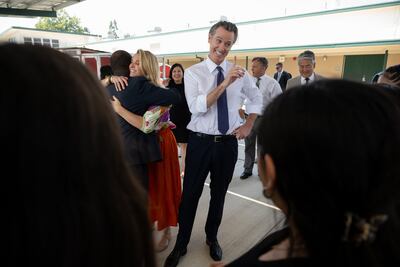The greatest British prime minister of recent years was, undeniably, Winston Churchill. He became an MP in 1900 at the age of just 25, but he also knew when it was time to quit.
He retired from active politics after more than five decades when he turned 80. Churchill’s time had come and gone. He died 10 years later in 1965, a national hero.
It’s therefore interesting to contemplate the current American debate about age in politics. This is not just at the presidential level – Joe Biden is 80 and his probable challenger in the 2024 election, Donald Trump, is 77 – but also in so many other senior positions.
At times, Churchill seems almost youthful by comparison with modern American politicians.
Dianne Feinstein, the Democratic Senator from California, is 90. She has been unwell and will not run again in 2024. Chuck Grassley, the Republican Senator from Iowa, will be 90 next week. Nancy Pelosi, the former speaker of the House of Representatives, is aged 83 but has confirmed she will seek re-election in 2024. Mitch McConnell, the Republican Senate leader, is 81 and has various health issues.
The list of what some commentators rather cruelly call America’s political gerontocracy is a long one. And for some Americans, these ageing politicians are a problem. Their presence in top jobs stifles new, younger talent with fresh ideas.

In 2022, a third of Democrats (33 per cent) told a New York Times poll that they wanted a different candidate from their party for president in 2024 because Mr Biden’s age was problematic.
Nikki Haley, a sprightly 51-year-old Republican presidential hopeful from a younger generation, pointedly suggested to potential voters, as she launched her campaign, that Republicans supporting Mr Trump may have a similar problem. Ms Haley said: “America is not past our prime – it’s just that our politicians are past theirs.”
The bigger question is not why old politicians cling to power but how they manage to do it. The answer is the extraordinary power of incumbency.
Newcomers can of course enter the race and overturn sitting politicians. But the advantages almost always lie with those already in the job, except for when there are scandals. These advantages include name recognition, plenty of news coverage and money.
Mr Biden is the obvious example. One political commentator told me that Mr Biden may want to do a Churchill and hand the baton of the Democratic Party nomination to someone else, but he won’t. The prospect of a Trump presidency keeps Mr Biden in the race because, as this Democratic Party commentator told me, “a second Trump presidency means the end of American democracy” and Mr Biden knows that.
Even if you don’t buy that argument entirely, it is certainly true that as incumbent president, Mr Biden has many advantages.
First, he beat Mr Trump in the 2020 presidential election. In 2024, he may indeed be the best “Stop Trump” candidate, as he appears to believe.
Second, any incumbent president seeking a second term has what former president Theodore Roosevelt called the “bully pulpit”. Roosevelt meant that a president is the Number One newsmaker in the world and dominates American news.
Third, incumbency, in the old American political joke, is like yeast. It makes the dough rise.

According to the US Centre for Responsive Politics, the 2020 presidential and Congressional election campaigns were by far the most expensive in history, costing a colossal $14 billon. Money tends to flow to those already considered to be winners, those in office, and that money funds the multimillion-dollar TV and social media advertising battles at the centre of any modern American campaign.
Of course, Mr Biden could lose. George H W Bush and Jimmy Carter are recent examples of one-term presidents, but both lost because they faced enormous economic and other crises as well as highly competent opponents.
The US presidency in 2024 is therefore still within Mr Biden’s grasp. Assuming he remains healthy, being the “Not Trump Candidate” may see him through. Yet Mr Trump also has his own “bully pulpit”, the fawning supposed “news” coverage on pro-Trump TV stations and social media. Mr Trump also has the reputation of destroying those within his own party who do not enthusiastically support him.
But the next generation of talent is biding their time. Ms Haley is just one of many rising stars on the Republican side.
Among Democrats, there is Vice President Kamala Harris, who is 58 – although according to some within her own party, she has proved a disappointment. Michigan Governor Gretchen Whitmer, also in her 50s, is another politician tipped for future stardom. She governs a swing state – as does Josh Shapiro of Pennsylvania, who is also 50-ish and tipped for higher things. So is California Governor Gavin Newsom, also in his 50s, and one to watch for in the 2028 presidential election. And in Florida, Maxwell Frost became the first Gen-Z member of Congress. Mr Frost is currently 26, in the same age range as Churchill when he first became a British public representative.
In the words of the TV show, America has talent. The question is not whether a generational shift will occur. It is when. Soon, but probably not in 2024.


